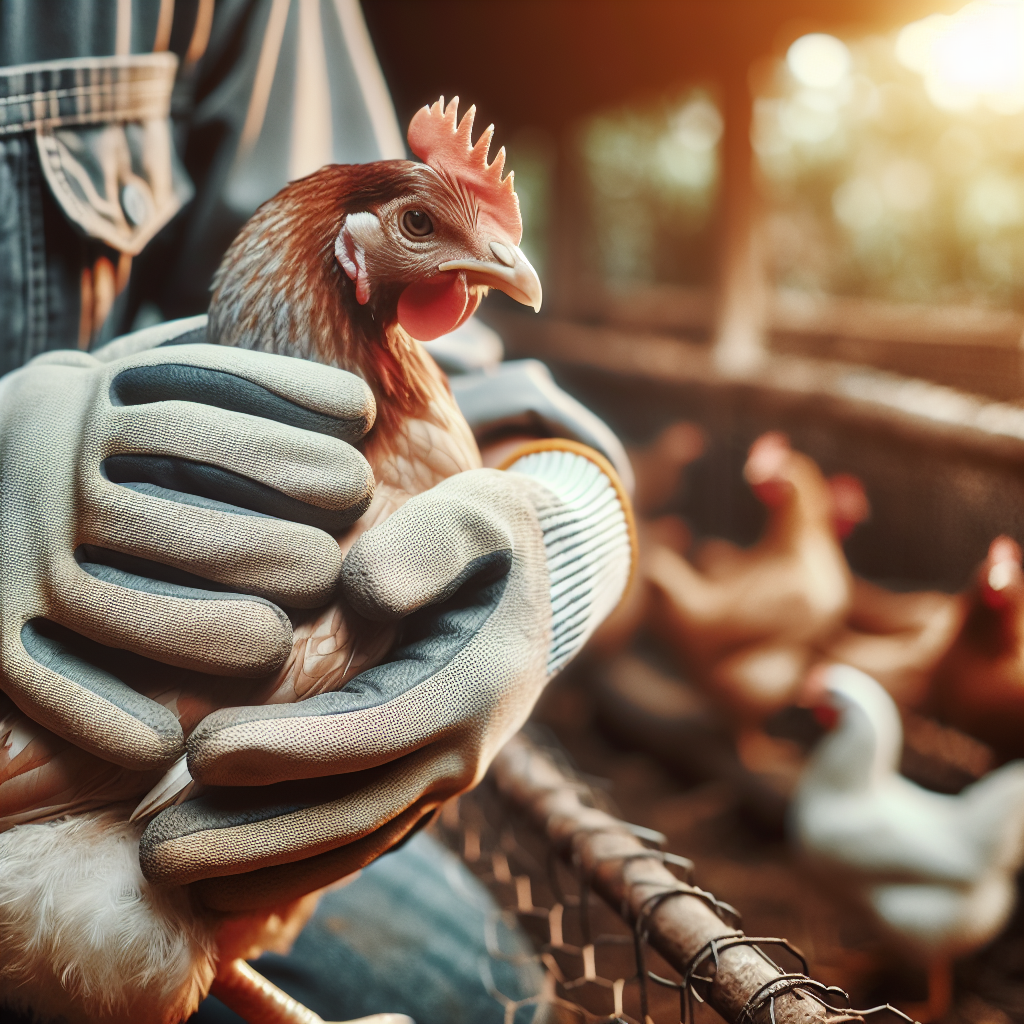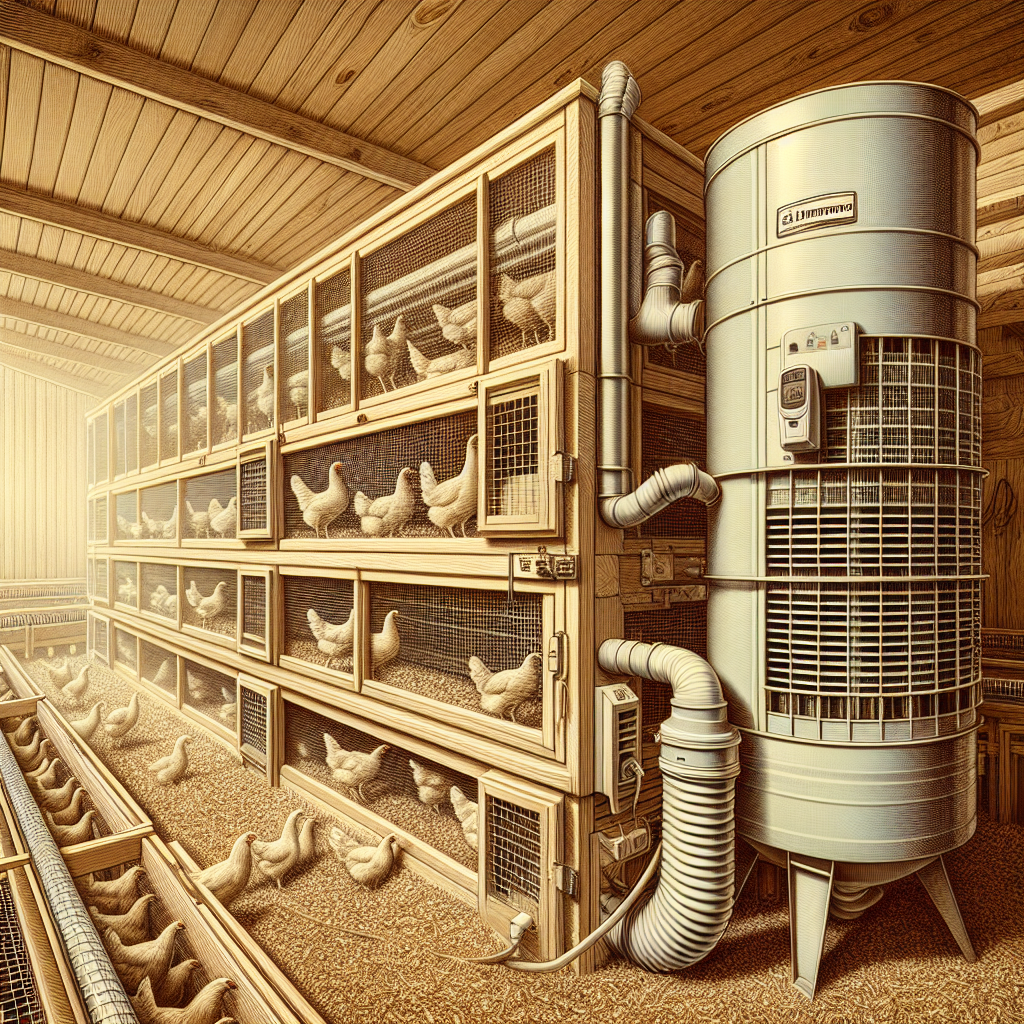Keeping your coop in top shape is essential for ensuring consistent egg production and quality. From providing a clean and comfortable environment for your flock to implementing proper nutrition and regular health checks, there are various steps you can take to maintain the coop effectively. In this article, we will explore some practical tips and strategies that will help you optimize your coop’s maintenance routine and keep your eggs coming in absolutely fresh and fabulous. So grab your tool belt and get ready to give your feathered friends the coop of their dreams!
Importance of Coop Maintenance for Egg Production
When it comes to keeping your chickens healthy and productive, regular coop maintenance is crucial. A clean and well-maintained coop provides a sanitary environment for your hens to live in, reduces the risk of diseases, and ensures optimal conditions for the egg-laying process.
Regular Cleaning and Sanitization
Cleaning your coop regularly is essential for maintaining the health and well-being of your hens. A dirty coop can harbor bacteria, parasites, and other pathogens that can lead to diseases and lower egg production. It is recommended to remove soiled bedding and waste daily and thoroughly clean the coop at least once a month.
During the cleaning process, make sure to remove all bedding, sweep and scrub the floors, walls, and nesting boxes, and disinfect all the surfaces using a poultry-safe disinfectant. This will help eliminate any potential contaminants and create a clean and hygienic environment for your hens.
Proper Ventilation and Temperature Control
Good ventilation is essential for maintaining a comfortable and healthy environment inside the coop. Adequate ventilation helps remove excess moisture, ammonia, and odors, which can be harmful to your hens’ respiratory health. It also helps regulate the temperature inside the coop, preventing overheating during hot weather and reducing the risk of frostbite in colder climates.
To ensure proper ventilation, make sure your coop has enough windows or vents that can be opened and closed as needed. These openings should be strategically placed to allow fresh air to circulate without creating drafts. In addition, consider using fans or ventilation systems, especially in larger coops, to improve air circulation.
Routine Inspections for Structural Integrity
Regular inspections of your coop are essential for identifying and addressing any structural issues that could compromise the safety and well-being of your hens. Inspect the walls, roof, windows, doors, and flooring for any signs of damage or wear and tear. Check for loose or rotten boards, gaps, holes, or any potential entry points for predators.
Repair or replace any damaged or weakened areas promptly to prevent further deterioration and ensure the coop remains secure. Regular inspections can help you catch and fix problems early on before they become more serious and costly.
Ensuring Optimal Coop Conditions
Apart from regular maintenance, providing the right conditions in your coop is vital for your hens’ overall health and productivity.
Providing Sufficient Space for Each Hen
One of the key factors in maintaining a healthy and productive flock is providing sufficient space for each hen. Overcrowding can lead to stress, aggression, and increased risk of diseases. A general guideline is to provide at least 4 square feet of coop space per hen, and 8-10 square feet of outdoor space per hen if free-range access is available.
Adequate Nesting Boxes and Bedding
Comfortable and clean nesting boxes are important for encouraging your hens to lay eggs in the designated areas. Provide one nesting box for every 3 to 4 hens and ensure they are filled with clean and soft bedding material such as straw or wood shavings. Regularly check and replace the bedding to maintain cleanliness and prevent the spread of bacteria.
Access to Fresh Water and High-Quality Feed
Water is essential for maintaining your hens’ overall health and productivity. Make sure your chickens have access to fresh and clean water at all times. Consider using waterers that prevent spillage and contamination.
In addition to water, providing a balanced and nutritious diet is crucial for optimal egg production. Ensure your hens have access to a high-quality and properly formulated chicken feed that meets their nutritional requirements. Supplementing their diet with kitchen scraps, greens, and calcium-rich treats like crushed oyster shells can also support their overall health and egg production.
Disease Prevention and Biosecurity Measures
Preventing and managing diseases is essential for maintaining a healthy flock and ensuring consistent egg production and quality.
Implementing Vaccination Programs
Consult with a poultry veterinarian to develop a vaccination program tailored to the specific diseases prevalent in your area. Vaccinations can help protect your flock from common poultry diseases, such as Marek’s disease, Newcastle disease, and Avian Influenza. Follow the recommended vaccination schedule and keep accurate records of vaccinations administered.
Regular Parasite Control
External and internal parasites can cause significant harm to your hens and decrease egg production. Implement a regular parasite control program that includes regular deworming and treating for external parasites like mites and lice. Use poultry-safe products and follow the recommended usage instructions.
Quarantine and Biosecurity Protocols
Introducing new chickens to your flock without proper quarantine and biosecurity measures can introduce diseases and compromise the health of your existing flock. Quarantine new birds for at least two to four weeks to observe them for any signs of illness. During this period, keep them separate from the rest of the flock and monitor their health closely.
Practice good biosecurity measures to prevent the introduction and spread of diseases. This includes limiting visitor access to your coop, wearing dedicated footwear, and frequently washing your hands before and after handling chickens or entering the coop.
Managing Hen Health and Nutrition
Taking care of your hens’ health and providing them with optimal nutrition is essential for consistent egg production and quality.
Balanced Feed and Supplements
Offer a nutritionally balanced feed that meets the specific needs of your hens. Different life stages may require different types of feed. For example, starter feed is suitable for young chicks, while layer feed is formulated for laying hens.
Supplementing your hens’ diet with additional nutrients, such as vitamins, minerals, and probiotics, can further support their health and egg production. Consult with a poultry nutritionist to determine the appropriate supplements for your flock.
Monitoring Egg-Laying Patterns
Keeping track of your hens’ egg-laying patterns can provide valuable insights into their health and well-being. Monitor the frequency and consistency of egg production, as well as any changes in egg size or quality. Sudden drops in egg production or abnormal eggs can be indicators of underlying health issues.
Providing Calcium for Strong Eggshells
Calcium is essential for the formation of strong eggshells. Ensure your hens have access to a calcium source, such as crushed oyster shells or commercial calcium supplements. Calcium deficiency can lead to thin or brittle shells, making eggs more prone to breakage and reducing their overall quality.
Predator Proofing and Security
Protecting your flock from predators is crucial for their safety and the success of your egg production.
Installing Sturdy Fencing and Gates
Secure your coop and outdoor area with sturdy fencing that can effectively keep out predators. Use materials such as welded wire or hardware cloth, burying it at least six inches into the ground to prevent digging predators from gaining access. Ensure the fence is tall enough to deter predators from jumping over.
Install secure gates that can be locked to prevent unauthorized entry and potential attacks from predators. Regularly inspect the fencing and gates for any signs of damage or potential weak points.
Securing Coop Doors and Windows
Predators can find their way into the coop through small openings or weak points in the doors and windows. Regularly check the coop for any gaps or holes and repair them promptly. Use predator-resistant materials such as hardware cloth to cover windows and openings, ensuring adequate ventilation while preventing unwanted visitors.
Using Motion-Activated Lights or Alarms
Motion-activated lights or alarms can be effective deterrents against nocturnal predators. Installing these devices around the coop can help scare away predators and alert you to any potential threats. Make sure the lights or alarms are placed strategically to cover all vulnerable areas.
Controlling External Factors
External factors such as stress, weather, and extreme temperatures can impact your hens’ health and egg production.
Minimizing Stress and Disturbances
Minimize stressful situations and disturbances in your flock’s environment as much as possible. Loud noises, sudden changes, and overcrowding can all cause stress and lead to decreased egg production. Provide a calm and peaceful environment for your hens, and avoid unnecessary disruptions.
Weather Protection for Coop
Extreme weather conditions can directly impact your hens’ health and egg production. Ensure your coop is well-insulated and weatherproofed to protect your chickens from excessive heat, cold, wind, and moisture. Provide adequate ventilation and shade during hot weather and use insulation or heaters during cold weather to maintain a comfortable temperature inside the coop.
Avoiding Extreme Temperatures
Exposure to extreme temperatures can be harmful to your hens and adversely affect their egg production. Avoid placing the coop in direct sunlight or areas prone to extreme heat. Similarly, protect the coop from drafts and wind-chill during cold weather. Monitoring the temperature inside the coop and making necessary adjustments will help create a comfortable and optimal environment for your hens.
Addressing Behavioral Issues
Chickens can exhibit various behavioral issues that can disrupt egg production and flock harmony. Understanding and addressing these issues is key to maintaining consistent egg production.
Reduce Aggression and Pecking
Aggressive behavior and pecking can be detrimental to flock dynamics and egg production. Provide enough space, perches, and distractions to reduce boredom and limit aggressive behavior. If certain individuals are excessively aggressive, consider isolating or rehoming them to restore peace within the flock.
Providing Enrichment and Entertainment
Keeping your hens mentally stimulated and entertained is important for their overall well-being and productivity. Provide objects such as perches, dust baths, and hanging toys to keep them occupied and help prevent destructive behaviors. Offering access to a spacious outdoor area where they can forage and scratch can also alleviate boredom and promote natural behaviors.
Managing Broodiness
Broodiness, when a hen becomes determined to hatch eggs, can disrupt egg production. If you do not intend to breed, you can manage broodiness by discouraging nesting behaviors. Remove any eggs from nesting boxes promptly, provide a comfortable and spacious environment, and avoid allowing broody hens to sit on empty nests for extended periods.
Monitoring Egg Quality
Regularly monitoring the quality of your eggs is important to ensure they meet your desired standards.
Regular Visual Inspections
Inspecting your eggs visually is the first step in assessing their quality. Look for any cracks, irregular shapes, or abnormalities on the shell. Remove any eggs with visible dirt or debris to prevent cross-contamination.
Weight and Size Evaluation
Monitoring the weight and size of your eggs can help identify potential issues. Use a scale to measure the weight of a representative sample of eggs. Consistently large or small eggs may indicate problems with nutrition, health, or age.
Checking Shell Integrity
Eggshell quality affects both the visual appeal and the protection of the egg. Check for shells that are too thin or excessively brittle, as they may be more prone to breakage and contamination. Providing a calcium source and a well-balanced diet is crucial for strong and healthy eggshells.
Egg Collection and Storage Practices
Proper handling and storage of eggs after collection helps to maintain their freshness and quality.
Collecting Eggs Frequently
Collect eggs at least once or twice a day to minimize the risk of damage or contamination. Leaving eggs in the nest for an extended period can increase the likelihood of breakage and attract pests.
Proper Handling and Cleaning
Handle eggs with care to avoid unnecessary cracking or damage. If an egg is dirty or soiled, gently wipe it with a dry cloth or fine-grit sandpaper. Avoid washing eggs with water unless absolutely necessary, as this can remove the protective bloom that helps prevent the entry of bacteria.
Appropriate Storage Conditions
Store eggs in a clean and cool location, ideally at temperatures below 45 degrees Fahrenheit (7 degrees Celsius). Use an egg carton or storage tray to prevent eggs from rolling or touching each other, reducing the risk of breakage. Avoid storing eggs near strong-smelling foods or substances, as they can absorb odors.
Record Keeping and Analysis
Maintaining detailed records of your coop’s maintenance, health management, and egg production can provide valuable insights, help track progress, and identify areas for improvement.
Tracking Egg Production
Record the number of eggs collected each day, taking note of any variations or patterns. This data can help identify seasonal changes, production trends, and any abnormal drops or increases in egg production.
Recording Health and Medications
Maintain a log of any health issues or medications administered to your flock. Note any vaccinations, deworming treatments, or other health-related activities. This record will help you keep track of your hens’ health history and identify any recurring issues.
Analyzing Performance Data
Regularly review and analyze the data collected to evaluate the overall performance of your flock. Look for any correlations between maintenance practices, diseases, nutrition, and egg production. Use this information to make informed decisions and adjustments to optimize your coop’s conditions and productivity.
By following these comprehensive coop maintenance practices, you can ensure consistent egg production and quality, as well as provide a healthy and comfortable environment for your flock. Regular cleaning, appropriate care, and disease prevention measures will help keep your hens happy and productive, resulting in a steady supply of fresh and high-quality eggs for you and your family to enjoy.




